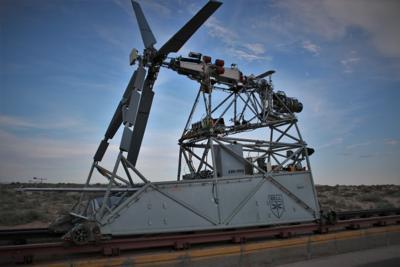Sat, Sep 16, 2023
The Past and Future of High-Speed Flight
Bell Textron Inc. has delivered a High-Speed Vertical Takeoff and Landing (HSVTOL) test-article to Holloman Air Force Base for demonstration and technology evaluation. Testing teams will leverage the Arnold Engineering Development Complex Holloman High Speed Test Track for purpose of vetting the test-article’s folding-rotor, integrated-propulsion, and flight control technologies at speeds representative of actual flight.

Bell executive vice-president of engineering Jason Hurst stated: “The HSVTOL test-article delivery and start of sled-testing operations serves as a major milestone in our mission to develop the next generation of high-speed vertical lift aircraft. Bell plans to showcase HSVTOL technology informed by more than 85-years of high-speed rotorcraft development and leverage lessons learned to produce a flying prototype with game-changing capabilities.”
Bell, by dint of the forthcoming sled-test regimen, seeks to validate key technologies by way of a full-scale, integrated demonstration in a representative operating environment. Bell plans for the test-article to execute a series of HSVTOL high-speed transition maneuvers—a first-of-its-kind capability for vertical lift aircraft. Prior to the HSVTOL test-article’s delivery to Holloman Air Force Base, Bell successfully completed functional demonstrations of the contraption at the company’s Flight Research Center.

Bell’s High-Speed Vertical Takeoff and Landing (HSVTOL) technology amalgamates the hover capability of a conventional helicopter with the speed (four-hundred-plus-knots), range, and survivability of a fixed-wing jet aircraft. Bell has developed high-speed vertical lift technology for more than 85-years, pioneering innovative VTOL configurations such as the X-14, X-22, XV-3, and XV-15 for customers the likes of NASA, the U.S. Army. and U.S. Air Force. The antecedent vehicles build on Bell’s proven history of high-speed flight, which extends back to the Bell X-1—the storied rocket-powered experimental aircraft in which then Captain Charles “Chuck” Yeager made the world’s first manned supersonic flight on 14 October 1947.
More News
Airplane Bounced About 3 Ft Then Touched Back Down And Then, With No Brakes Applied, The Airplane Began Veering To The Left Analysis: The pilot entered the airport traffic pattern >[...]
Aero Linx: British Microlight Aircraft Association (BMAA) The primary focus within all aviation activity is SAFETY. In all aspects of our sport SAFETY must come first, whether it b>[...]
From SnF25 (YouTube Edition): William Wynne Builds Practical Aircraft Engines on the Corvair Platform Seeking an affordable alternative to the traditional aircraft engine options, >[...]
How To Get A Story On Aero-TV News/Feature Programming How do I submit a story idea or lead to Aero-TV? If you would like to submit a story idea or lead, please contact Jim Campbel>[...]
From 2023 (YouTube Edition): Bridge of CiES CiES Inc. is a Bend, Oregon-based designer and manufacturer of modular embedded aircraft systems and sensors. The company’s fuel-l>[...]
 NTSB Final Report: Aviat A1
NTSB Final Report: Aviat A1 ANN's Daily Aero-Linx (07.08.25)
ANN's Daily Aero-Linx (07.08.25) Classic Aero-TV: Fly Corvairs Reliable Engine Alternative
Classic Aero-TV: Fly Corvairs Reliable Engine Alternative ANN FAQ: Contributing To Aero-TV
ANN FAQ: Contributing To Aero-TV Classic Aero-TV: CiES Fuel-Quantity and e-Throttle Systems Praised
Classic Aero-TV: CiES Fuel-Quantity and e-Throttle Systems Praised




